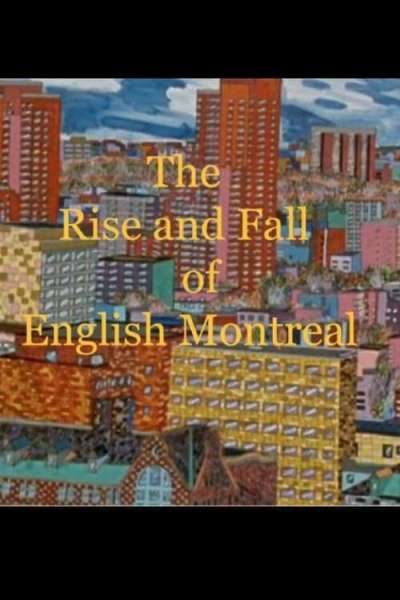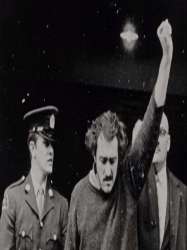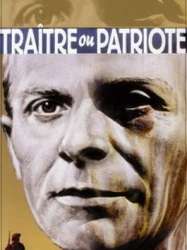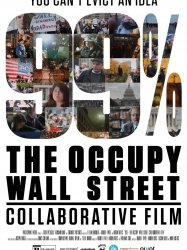The Rise and Fall of English Montreal is a canadien film of genre Documentary directed by William Weintraub with Vlasta Vrána
The Rise and Fall of English Montreal (1993)

If you like this film, let us know!
The Rise and Fall of English Montreal is a 1993 Canadian documentary film directed by William Weintraub and produced by the National Film Board of Canada in Montreal.
The film deals with exodus of English-speaking Quebecers that began in the 1960s and was accelerated by the Quebec general election, 1976.
Actors
Comments
Leave comment :
Suggestions of similar film to The Rise and Fall of English Montreal
There are 14 films with the same actors, 1 films with the same director, 8961 with the same cinematographic genres, 8502 films with the same themes (including 1 films with the same 5 themes than The Rise and Fall of English Montreal), to have finally 70 suggestions of similar films.If you liked The Rise and Fall of English Montreal, you will probably like those similar films :

Time Bombs (2007)
, 46minutesDirected by Guylaine Maroist
Origin Canada
Genres Documentary
Themes Environmental films, Politique, Documentary films about environmental issues, Documentary films about war, Documentary films about historical events, Documentary films about nuclear technology, Documentaire sur une personnalité, Documentary films about health care, Documentary films about technology, Political films
Actors Vlasta Vrána, Réal Bossé
In the spring of 1957, 40 young Canadian soldiers were sent to Nevada on a top secret mission. These young men did not know they would be used as guinea pigs in the most important nuclear testing program of the Cold War. The American military wanted to know how the average soldier would hold up on a nuclear battlefield.

A Matter of Fat (1969)
Directed by William Weintraub
Origin Canada
Genres Documentary
Themes Documentary films about health care, Films about disabilities
Actors Lorne Greene
 , 58minutes
, 58minutesDirected by Robin Spry
Origin Canada
Genres Documentary
Themes Films about terrorism, Documentary films about law, Documentary films about war, Documentary films about historical events, Documentary films about politics, Documentary films about terrorism, Documentary films about cities, Political films, Documentary films about Quebec politics

Being Osama (2004)
Directed by Mahmoud Kaabour
Origin Canada
Genres Documentary
Themes Films based on the September 11 attacks, Films about racism, Films about religion, Films about terrorism, Transport films, Aviation films, Documentary films about racism, Documentary films about law, Documentary films about war, Documentary films about historical events, Documentaire sur une personnalité, Documentary films about politics, Documentary films about religion, Documentary films about technology, Documentary films about terrorism, Documentary films about cities, Political films, Films about Islam, Disaster films, Films about aviation accidents or incidents, Films about language and translation, Films about hijackings
Rating70%





The documentary details the lives of six Montreal Arab men, all with the first name "Osama":

Traitor or Patriot (2000)
Directed by Jacques Godbout
Origin Canada
Genres Documentary
Themes Politique, Documentary films about historical events, Documentaire sur une personnalité, Documentary films about politics, Political films, Documentary films about Quebec politics
Actors Jacques Godbout
Rating67%





It analyzes the place of Quebec Premier Adélard Godbout in history. Godbout is not well-considered by Quebec historians and citizens. Adérald Godbout was the Second World War–era Quebec head of government, and the great-uncle of the director. Godbout advances some theories to explain why his great-uncle was forgotten in the collective memory of the Quebecers. One theory is that Adélard Godbout was more favourable than other political leaders to conscription. Quebec nationalists, at the time, opposed conscription, which they saw as a British imperialist manoeuvre of English Canada to defend the Empire.

Cairo Drive (2013)
, 1h19Genres Documentary
Themes Transport films, Documentary films about historical events, Documentary films about politics, Documentary films about technology, Documentary films about cities, Political films
Rating74%





The film begins in 2009 and opens with aerial shots of Cairo's geometrical gridlock, while Handel's Water Music plays seamlessly in the background. The serenity is quickly broken, however, by a series of ground-level shots of bumper to bumper traffic, shouting taxi drivers, and an endless symphony of car horns. Amidst this mélange of 14 million vehicles, it appears that not even the traffic police understand how it all works. Yet through a series of comical behind the wheel interviews, it becomes clear that the array of sounds and gestures represents an ongoing dialogue between the city's 20 million residents. However, the film also touches upon the city's darker side. Corruption is rampant and despite residents' crafty work-arounds, the situation is without question out of control and getting worse. One resident describes crossing Cario's streets, many of which have eight or more "lanes", as a giant game of Frogger. A more poignant moment comes when a long-time American resident of Cairo recounts how his daughter, 18, was struck and killed by a bus.

Origin USA
Genres Documentary, Crime
Themes Documentary films about historical events, Documentary films about politics, Documentary films about cities, Political films
Rating62%





99 cinéastes américains analysent le mouvement "Occupy Wall Street" contre le capitalisme financier : participants, soutiens, opposants sont interrogés sur sa genèse.
 , 1h27
, 1h27Origin USA
Genres Documentary
Themes Films based on the September 11 attacks, Films about religion, Films about terrorism, Transport films, Aviation films, Documentary films about law, Documentary films about war, Documentary films about historical events, Documentary films about politics, Documentary films about religion, Documentary films about technology, Documentary films about terrorism, Documentary films about cities, Political films, Films about Islam, Disaster films, Films about aviation accidents or incidents, Films about hijackings
Actors Kathleen Turner
Rating65%






Confrontation at Concordia (2003)
Origin Canada
Genres Documentary
Themes Films set in Africa, Films about religion, Documentary films about law, Documentary films about war, Documentary films about historical events, Documentaire sur une personnalité, Documentary films about politics, Documentary films about religion, Documentary films about cities, Political films, Films about Jews and Judaism
The documentary opens with scenes of the violence at the event, depicting fighting between protesters and Jewish students attempting to enter the venue. This is followed by an interview with student Samir Elitrosh, a leader of the Solidarity for Palestinian Human Rights and the leader of anti-Israel violence who was later suspended. It also features interviews with Concordia's Hillel president Yoni Petel and Concordia rector Frederick Lowy, and concludes with a discussion of what it sees as the growing trend of anti-Israel activities on North American campuses.
 Connection
Connection
